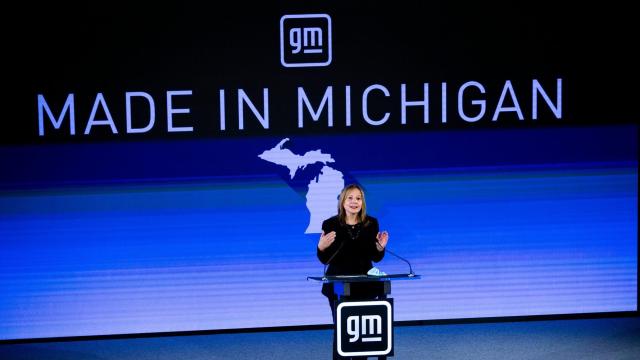General Motors helped hook Americans on gas-guzzling trucks and SUVs that have been a disaster for the climate. Now, it’s getting serious about a pivot to electric vehicles amid increased electrification efforts from other top automakers. On Tuesday the automaker announced it will invest roughly $US7 (A$10) billion to build out a new EV battery production plan in Michigan. It will also convert another already in use factory into a major producer of electric trucks.
On the battery side, GM said it’s partnering with EV battery maker LG Chemical and spending $US2.6 (A$4) billion to develop a new battery cell manufacturing plant that the company expects could go online by 2024. The larger chunk of the investment (around $US4 (A$6) billion) is going towards converting a current factory to serve at the main development site for the company’s Chevy Silverado EV and electric GMC Sierra. Yes, they’re still going to make monstrous vehicles. But hey, if that’s what it takes to kill the internal combustion engine…
In a statement, GM Chair and CEO Mary Barra said the company’s investment decision was made based on “positive consumer response and reservations for our recent EV launches.”
GM also had a little help along the way. According to the New York Times, the state of Michigan is providing GM with $US824 (A$1,144) million in economic incentives. In return, the company claims the new investment could create 4,000 new jobs.
The company joins a growing list of U.S. automakers supposedly pivoting to EVs. Ford, GM’s biggest competitor, has reportedly seen an outpouring of excitement for its new, reasonably priced F-150 Lightning. It also announced it would spend $US11 (A$15) billion to build three new battery factories. Stellantis — the parent company of U.S. icons Chrysler, Dodge, Jeep, and Ram — meanwhile has said it plans to dish out at least $US35.5 (A$49) billion to develop EVs and related technology through 2025.
The flurry of announcements comes after the Biden administration set an ambitious goal of ensuring electric vehicles account for half of all new U.S. car sales by 2030. New commitments from automakers are a good start towards that goal, but anyone who’s spent more than a few minutes on a major U.S. interstate lately will know there’s still a long way to go.
The U.S. is also lagging far behind other parts of the world in EV adoption, according to research firm Canalys. In the first half of 2021, EV represented just 3% of new car sales in the U.S. That’s an improvement from previous years for sure, but still far less than 12% and 15% of new car sales EV represented in China and Europe respectively during that same time.
